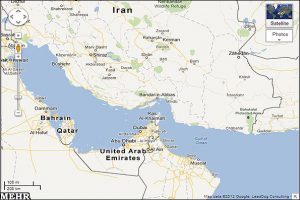Love and Hate
Weblog-News reported that recent Facebook campaigns with the message of friendship and peace between Iranians and Israeli’s are in fact nothing more than espionage campaigns.
The article stated that the primary goal of these campaigns is to extract personal information from users.
An example of one such campaign is “Israel-Loves-Iran”, seen here.
Who is Responsible?
In response to questions about the filtering of a website titled “Professors Against Plagiarism”, the Minister of Culture explained:
“The filtering committee is made up of about 14 different bodies, including the Ministry of Culture and Guidance. The committee operates under the attorney general’s guidance and the Ministry of Culture does not ever directly filter a website.”
Owning Up
In the culminating minutes of May 27th, and into the first few of the next day, some websites, including news agencies as well as news aggregating websites were blocked in Iran for a period of 1hour and 45min. The Telecommunications Company of Iran (TCI) took responsibility for the disconnection, blaming faulty equipment.
This is one of the rare times that an official organization has claimed responsibility for such an incident.
Historical Matters
Reactions to Google’s elimination of ‘Persian Gulf’ from its map feature are continuing in Iran. Over the past week, Deputy to Minister of Communications said that:
“We have spoken to the Secretary-General of the International Communication Union and asked for this mistake to be corrected.”
Ali Hakim-Javadi added that his ministry was working in step with the Ministry of Foreign Affairs on the matter. He further commented:
“Google is not a government collective, and the Iranian government’s complaint against this private sector company has to follow a particular process which will delay the final outcome. In this type of situation, it appears that internet users in Iran can be the most effective tool in voicing their concern.”
On the popularity of Google as a search engine and lack of an equivalent local replacement, Hakim-Javadi said:
“Currently there are many local and foreign search engines like Google, but users have become psychologically attached to Google…We’re not saying that Google is not a comprehensive search engine, but it is also not to the extent to stop us from satisfying our own daily needs with other search engines.”
He added:
“Regardless of all this, some national issues will obviously be important for people, and the historical background of the Persian Gulf goes beyond yesterday or today, or any particular government. It is surprising that in an information oriented society, a search engine which needs to be one-hundred-percent impartial, has reacted this way and distorted history.”
Self-Sustaining
The preliminary version of Iran’s National Search Engine was presented at the National ICT Festival. In an interview with Asre-Ertebatat, Hoomaan Ghasemi, head of the National Search Engine Research Group, announced that the final version of the engine will be available for the public by the end of the year.
Mr. Ghasemi explained some of the features which will set the national search engine apart from foreign ones:
“The National Search Engine will be fully compatible with Farsi. It will also cover local needs such as local services and urban information.”
Going Up in Flames
Wimax-Newx, reported on the widespread coverage of the Flame virus, by Iranian newspapers on May 30th.
“Discovery of a 20mb spy in Iran”, “Malignant virus in Iran’s cyber net”, “Flame 20-times more harmful that Stuxnet”, were amongst some of the headlines dedicated to the topic.
The first anti-virus tool for the virus has been presented to users by Iran’s Computer Emergency Response Team Coordination Center.
According to reports, Palestine, Hungary, Lebanon, Australia, Syria, Russia, Hong Kong, the UAE and Iran are some of the countries affected by this virus, believed to be from the same family as Stuxnet.
Iran Cyber Watch will be following this story closely.
Temporary Love
The Ministry of Culture has filed a complaint against the managers of the website “Sighe”. Apparently the managers had included the logo of the Ministry of Culture on their website, implying official government approval for their activities. “Sighe” refers to a temporary marriage which is religiously sanctioned. While no links to the website have been provided, it appears that it primarily functioned as a dating platform, accessible in the country. According to reports the website was registered as a blog in the country’s system.
Inflated Sense of Self
Based on a Haaretz report, IT-Analyze began its article titled “Israel’s Reaction to a Cyber-War with Iran”, stating:
“The Zionist regime limits access to its bank websites in fear of Iran’s cyber attacks.”
The article stated that Israel had blocked access to its banking system from “specific locations” in Iran, Saudi Arabia and Algeria.
Games
This year, Iran participated in the annual Casual Connect (computer game exhibition) held in Singapore 22-24 of May. The Iranian National Foundation for Computer Games was a Gold-Sponsor.
Supreme Council
In an official order, the President appointed Mehdi Akhavan Bahabadi as the Secretary General of the Supreme Council on Cyberspace and the Director of the Cyberspace Center. More in the coming weeks on this development.




